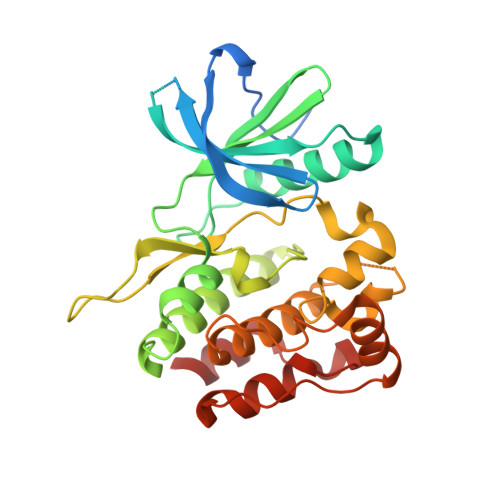Highly Selective Inhibition of Tyrosine Kinase 2 (TYK2) for the Treatment of Autoimmune Diseases: Discovery of the Allosteric Inhibitor BMS-986165.
Wrobleski, S.T., Moslin, R., Lin, S., Zhang, Y., Spergel, S., Kempson, J., Tokarski, J.S., Strnad, J., Zupa-Fernandez, A., Cheng, L., Shuster, D., Gillooly, K., Yang, X., Heimrich, E., McIntyre, K.W., Chaudhry, C., Khan, J., Ruzanov, M., Tredup, J., Mulligan, D., Xie, D., Sun, H., Huang, C., D'Arienzo, C., Aranibar, N., Chiney, M., Chimalakonda, A., Pitts, W.J., Lombardo, L., Carter, P.H., Burke, J.R., Weinstein, D.S.(2019) J Med Chem 62: 8973-8995
- PubMed: 31318208
- DOI: https://doi.org/10.1021/acs.jmedchem.9b00444
- Primary Citation of Related Structures:
6NZP, 6NZQ, 6NZR - PubMed Abstract:
Small molecule JAK inhibitors have emerged as a major therapeutic advancement in treating autoimmune diseases. The discovery of isoform selective JAK inhibitors that traditionally target the catalytically active site of this kinase family has been a formidable challenge. Our strategy to achieve high selectivity for TYK2 relies on targeting the TYK2 pseudokinase (JH2) domain. Herein we report the late stage optimization efforts including a structure-guided design and water displacement strategy that led to the discovery of BMS-986165 ( 11 ) as a high affinity JH2 ligand and potent allosteric inhibitor of TYK2. In addition to unprecedented JAK isoform and kinome selectivity, 11 shows excellent pharmacokinetic properties with minimal profiling liabilities and is efficacious in several murine models of autoimmune disease. On the basis of these findings, 11 appears differentiated from all other reported JAK inhibitors and has been advanced as the first pseudokinase-directed therapeutic in clinical development as an oral treatment for autoimmune diseases.
















